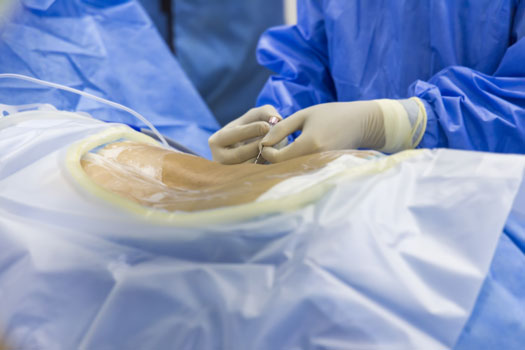
The surgical removal of all or part of a herniated or ruptured spinal disc, even if it involves minimally invasive techniques, does require some time to recover afterward—as with any surgery. As your body heals and the muscles that support your spine in the area where you had the herniated disc heal, there are some activities you'll want to avoid to reduce the risk of reherniation. Below, we go over the types of activities or movements it's best to avoid immediately after a discectomy.
Bending & Twisting
Bending or twisting, even if it's done fairly gently, can still irritate or reinjure the part of your spine that's healing. If you do have to bend to pick something up, either ask for help or use a handheld reacher or grabber, if possible. When there's a need to shift direction with your torso or lower back, move your entire body instead.
Heavy Lifting
The general recommendation following most types of back surgery procedures is to avoid lifting anything heavier than 5–10 pounds during your recovery period. This is about the weight of a gallon of milk. If you need to do any light lifting after your discectomy, keep proper lifting techniques in mind. This means:
• Keeping the object close to your body
• Using your knees to bend
• Not twisting or turning as you lift something
Strenuous Forms of Exercise
Exercise following a discectomy doesn't need to be avoided entirely. In fact, certain forms of exercise play an important role in recovery, strengthening the muscles that support your spine. This is necessary to reduce direct pressure on your spine and its discs from your movements. However, strenuous forms of exercise should be avoided in the immediate time period following disc-related surgery. These include:
• Weightlifting
• Running and jogging
• Contact sports
• Anything involving repetitive movements that could stress your spine
Driving
Recovering discectomy patients are typically advised to avoid driving for at least the first few weeks post-surgery. Part of the reason for this recommendation is because of the medications often prescribed following a procedure of this nature. Some of these painkillers could leave you feeling drowsy. When you do get back to driving, avoid excessive shifting of your body and sudden, forceful movements.
Intimacy & Daily Activities
Your doctor or surgeon can give you advice regarding specific activities of an intimate nature. This also applies to daily activities like showering or bathing and getting dressed. The general advice is to avoid anything that directly stresses or strains the affected area of your back.
Preparing before Your Discectomy
If you're in the process of preparing for a discectomy, there are some steps you can take prior to your procedure to avoid the activities and movements discussed above after your surgery—at least until given the okay by your doctor. Reduce your risk of overstressing your healing spine by:
• Arranging for some help with more demanding household tasks like vacuuming and yard work
• Preparing meals you can freeze and heat up to avoid too much movement while cooking
• Setting up a temporary sleeping area downstairs if your bedroom is upstairs
• Checking with your doctor or physical therapist before returning to pre-surgery activities
Although discectomy surgery is generally a very successful procedure, a hole is left in the outer wall of the disc. Patients with a large hole in the outer ring of the disc experience 70 percent of all reherniations after surgery. A new treatment, Barricaid, which is a bone-anchored device proven to reduce reherniations, was specifically designed to close the large hole often left in the spinal disc after discectomy. In a large-scale study, Barricaid was proven 95 percent effective in a study of over 500 patients. This means 95 percent of Barricaid patients didn’t undergo a reoperation due to reherniation in the 2-year study timeframe.
If you have any questions about the Barricaid treatment or how to get access to Barricaid, ask your doctor or contact us at 844-288-7474.
For full benefit/risk information, please visit: https://www.barricaid.com/instructions.


Comments